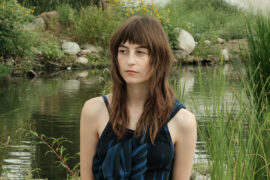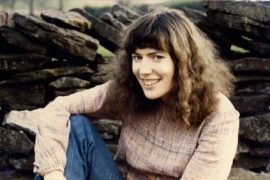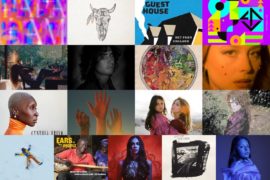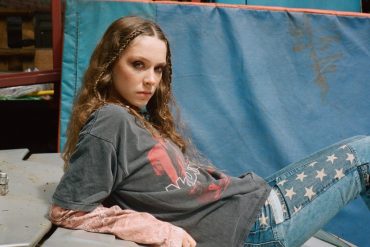If it is so hard for bands to stand out these days, then how do Glass Animals make it look so easy? The hypnotic jungle psychedelia of the Oxford group’s 2014 debut Zaba immediately set Glass Animals apart, introducing them to the world in the best way possible with a thoroughly engaging listening experience. From the hot ‘n sweaty after-hours vibe of songs like “Gooey,” “Black Mambo” and “Hazey,” to the psychedelic, mysterious narratives on “Flip” and “Toes,” to the serene calm and joyous melodies of “Pools,” Zaba is immersive, heavy and whole – easily one of the most unique debuts on record.
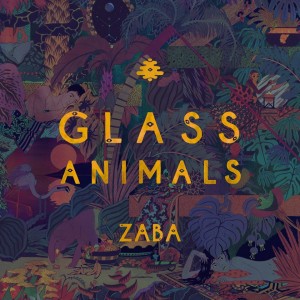
Going into their second album, Glass Animals knew they wouldn’t be making a Zaba pt. II. Their debut had been a wonderful experiment: A fever dream collage which, thanks to singer/songwriter/producer Dave Bayley’s wondrous imagination and the collected musical talents of Bayley, drummer Joe Seaward and multi-instrumentalists Edmund Irwin-Singer and Drew MacFarlane, the band were able to bring to life. On the first go-around, the band had been explorers on a mission, testing things until they reached their definition of “perfection.”
On the second run, Bayley and the gang knew what they were after – they just had to make it happen. “Each song is a different story about a different character… I guess that came from touring a lot and meeting hundreds of people every day,” explains Bayley. “You meet so many people on tour – it’s kind of crazy – and they all tell you different stories, different things about them, about their friends and different weird tales, and I started recording them all.”
Those “field recordings” ended up being the inspiration for Glass Animals’ next project. “Having an idea like that – something to aim towards; something in the background, that was kind of connecting all these things – made the whole process really exciting,” recalls drummer Joe Seaward. Instead of crafting the sounds and beats first, then adding melody and vocal lines later, Glass Animals approached their sophomore album “backwards,” injecting meaning into lyrics and melodies first.

The result, How to Be a Human Being (out 8/26 via Wolf Tone/Harvest Records) is not so much a “concept album” as it is a pastiche of eleven different character-driven musical tales, each with its own colorful vibrancy. Atwood Magazine dug into the meaning of lead single “Life Itself” earlier this year, concluding that the album opener “reflects an anchoring on the band’s part to focus more on human elements in their subject matter” – a big step for Glass Animals as they discover a new way to connect with their audience, and a new way to make music.
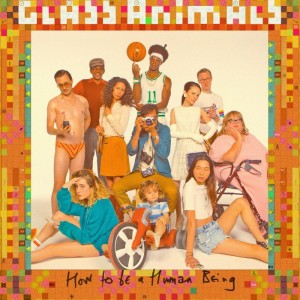
Glass Animals set the bar high with Zaba, and they continue to push musical boundaries on How to Be a Human Being. Be warned, this is not the same Glass Animals you met two years ago: The band have grown, as have the sounds in Dave Bayley’s head. As Seaward puts it, the new album is a spontaneous and excited “snapshot” of Glass Animals’ musical capabilities right now, in 2016. Good advice to any listener of Glass Animals should be to expect the unexpected: Go in with a fresh head, and you will come out refreshed.
Glass Animals’ music is cohesive, yet tremendously diverse – a characteristic they are very visibly proud of. The band continue their foray into sonic experimentation on How to Be a Human Being, trailblazing both conceptually and musically as they develop for us a new world – or is it eleven new worlds? – in which we may all become music architects, dissecting the human psyche one song at a time.
In anticipation of How to Be a Human Being, Atwood Magazine spoke with Glass Animals’ Dave Bayley and Joe Seaward about the context and underlying elements of their sophomore record. Get to know Glass Animals through our exclusive interview, and listen to How to Be a Human Being, out 8/26/2016.
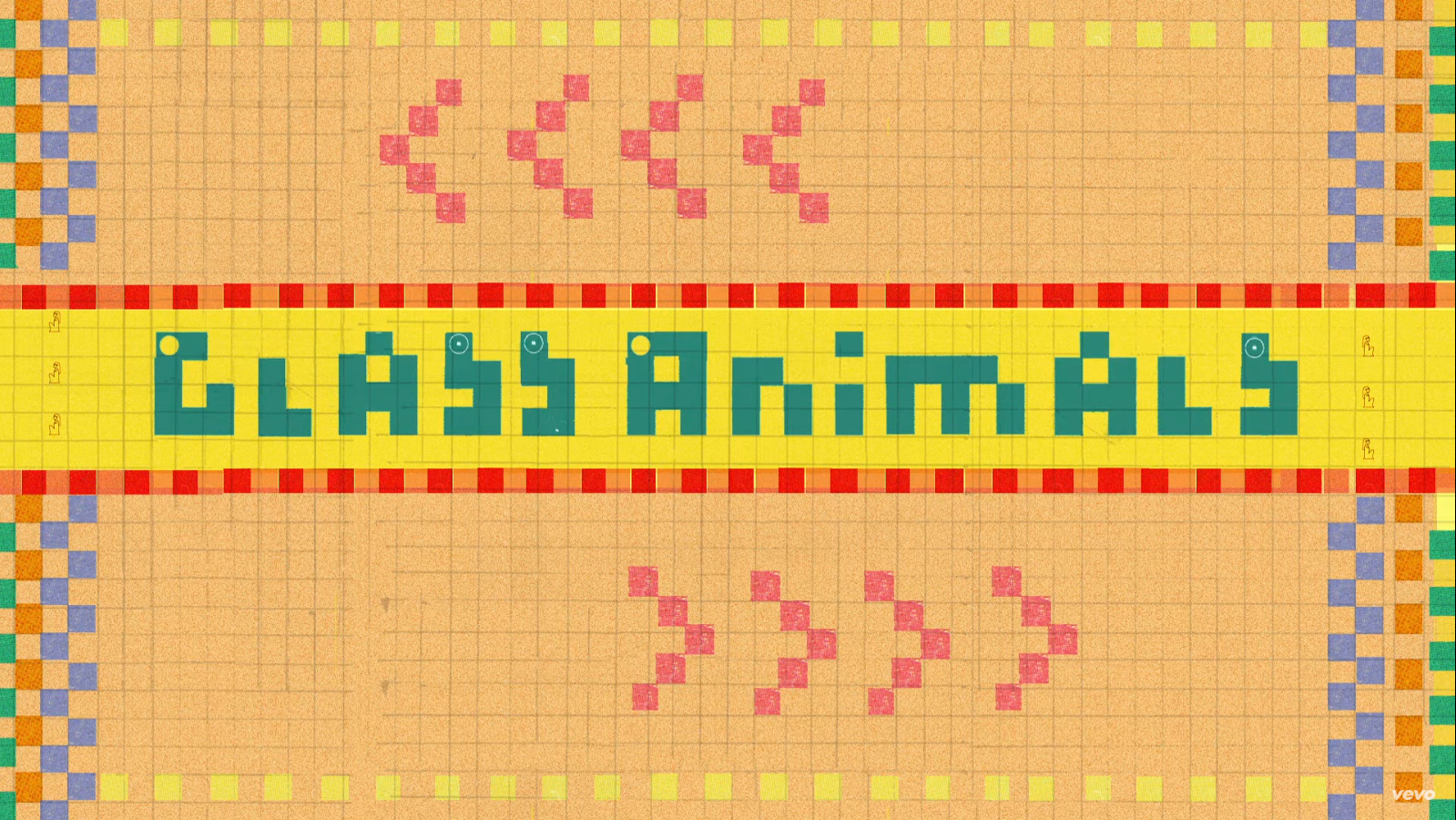
A CONVERSATION WITH GLASS ANIMALS
Atwood Magazine: Thanks for meeting up, guys. Okay, so today is July 25th. How to Be a Human Being comes out in exactly a month, but it's been mixed and mastered for some time now. How have you been coping with the delay between the completion and release?
Joe: It’s kind of part of the game, I guess… You get used to it. But I mean, I’m really excited to have it out in the world – it’s one of those things where, like, this thing has been done and finished; it wasn’t made with the intention of it just being able to be heard by us, so… I kind of feel like it’s ready – about time
Dave: It’s been quite quick, though! Quicker than most records, I imagine. We probably finished it in the very beginning of June – like around my birthday – and now it’s the end of July. So I mean, that turnaround is not bad.
Whenever I write a song, I often have this compulsion to show it to the world, immediately - as soon as possible.
Dave: Yeah –
Joe: Do you leak your own record? (laughs)
Essentially! Is there someone you typically go to, after a song is completed, to show them? Do you feel that compulsion?
Joe: Hmm, yeah – me.
Dave: I show it to Joe. (laughs) Well, we’ve got the elders.
Joe: The elders – yeah, the elders are important. If it passes the elders then we’re okay.
Dave: If it passes the elders’ test, then you’re on to a winner. Yeah, there are a couple people who work at the label who we trust a lot. Paul (Epworth) is one of them – he is the label, so we do play stuff to him, and he is a perfectionist, so if it passes his test, then that’s a pretty good thing. We then do have a team of secret people, called “the elders.”
A team of secret people?
Dave: We didn’t actually play them anything until it was all finished and mastered and everything.
I'm imagining a tribunal of parents.
Dave: Pretty much.
Joe: It’s kind of that, and other important people.
Dave: Yeah, they wear big robes and gowns –
Joe: – hats and stuff, yeah; have massive poles –
Dave: Yeah, you come in and sit down on their huge bed, dynamic headphones, tube amplifiers, yeah.
Joe: I always think a good test for me, personally, of whether a song is good is whether or not I’m excited for my friends and family to hear it. If that’s a thing, then I’m like, okay this cool, and if I’m not – I’m like, I don’t want anyone to ever hear this – then that’s a warning sign. I don’t think I have a specific person.
Used to be you put out a record every couple years, and it would usually have some filler. I feel like it's harder and harder for an artist to create that filler these days.
Dave: I don’t like filler! I don’t know, I like to think that the sum of all the tracks is stronger than each individually, in theory. If you listen to an album from start to finish, then it should be much more powerful than just any of the songs on their own. Each song on its own is essentially like a chapter of a book – really bloody good, and really enticing and interesting – but if you stick it in with a bunch of other chapters, you can actually really start to do something exciting.
Joe: And all the chapters can’t be, like, full throttle all the time, because otherwise you lose the excitement.
Dave: They can’t be the same, no.
Watch: “Life Itself” – Glass Animals
[youtube=https://youtu.be/yd9p4n5hLEg?t=0s]
Maybe we should take a step back first, because I understand that your songwriting process totally changed between Zaba and How to Be a Human Being.
Dave: Yeah, it changed quite a bit! I was doing all the production first on the first record – sounds, noise, beats and stuff – and then doing vocal lines over the top. But this time it was… Yeah, vocal lines, vocal melodies and lyrics – basics first – and then pushing the sounds around it, for the most part. There’s a song on the record that wasn’t like that, called “Cane Shuga;” that one was a beat first, but yeah – for the rest of them, it was all the other way around.
What was your proudest moment on Zaba, as a songwriter?
Dave: Just it being there? Being able to do it! That was mad! I don’t know, I thought it was pretty amazing.
Did the record have a purpose when you were making it?
Dave: It was, uh… What was its purpose? (laughs) I don’t know!
Joe: It was supposed to be, like, a journey. It was supposed to be like a weird little adventure.
Dave: Yeah, the idea was that it all took place in this rain forest, and that’s where the sounds are all pulled from. That transcended into the live show, where we brought palm trees and created that same kind of lighting. That was the idea of it – as for purpose, I don’t know…
Joe: (laughs) fill our time?
Dave: Try to do something interesting, that we find interesting. That’s always a good purpose.
Going off of that, then why do you think your songwriting approach changed?
Dave: Why? It changed, mainly, because of the idea of the record – the idea of the record was very, very different from the last one, and there were a couple different things I wanted to do with this record, that I didn’t really think about on the last record. This record, I definitely wanted it to be more human. The last record was so shy; so abstract. I wanted this to be much more… I don’t know, just not shy! There are much more extremes on this record! Like, super intimate bits; super loud, in-your-face bits; I wanted that to be part of it, and I think a lot of that can come from the words that you use. I didn’t pay that much attention to it the first time around, and this time I’m paying much more attention to lyrics.
Does that affect the significance and meaning of the different songs, and what they represent to you?
Dave: I think, yeah? I mean, all the songs on the first record mean something to me. I’m not sure if anyone else would ever be able to like, decrypt them, because they’re totally stream-of-consciousness stuff.
Joe: I tried and failed.
Dave: Joe tried (laughs) you didn’t fail! I mean –
Joe: I mean, no I didn’t fail. I figured out what one of the songs meant, and I told Dave that I’d figured it out, I was like, “I’ve fucking got you. I worked it out, fuck you,” and he was like, “That’s completely not what the song’s about.”
Dave: Now I don’t tell anyone what the songs are about anymore. It ruined Joe’s day –
Joe: Yeah, It kind of ruined it for me..
So I can’t ask you the significance of the lyrics, “peanut butter vibes”?
Dave: You can – I can try to explain it, it’s like – there are a lot of lyrics in that song that are kind of cheekily painting a picture about the character, you know, this narrator, is someone who’s possibly doing some naive… which is where the kind of “Pooh bear” thing came from. That kind of whimsy character who’s maybe a bit silly, and keeps making the same mistakes… He’s always getting stuck chasing the same thing, Winnie the Pooh, isn’t he? He’s always chasing that little taste of honey, and always ends up getting in trouble because of it – he never learns! Silly guy.
He’s always getting stuck chasing the same thing, Winnie the Pooh, isn’t he?
Joe: Silly bear!
Listen: “Gooey” – Glass Animals
[soundcloud url=”https://api.soundcloud.com/tracks/134452052″ params=”color=ff5500&auto_play=false&hide_related=false&show_comments=true&show_user=true&show_reposts=false” width=”100%” height=”166″ iframe=”true” /]
Did you spend a lot of time deliberating on lyrics for the first record?
Dave: Some of it was quite stream of consciousness on the first record… Yeah, I wanted them first – and this record as well; don’t get me wrong – the main thing I was thinking about was trying to almost create sounds with the words, and choose the words based on how they actually fit the sonic… It was all about sounds our first record, for me. It started with sounds, and the lyrics came after the sounds. Because of that, I think the sounds of the lyrics were actually really important to me. They were really important on this record as well, but because I started backwards, I could almost… put the meanings…
Is it starting backwards?
Dave: I don’t know, it is and it isn’t.
Joe: Well, it’s starting backwards compared to what we were doing last time. It’s not backwards in everyone else’s terms, I don’t think; just backwards from what we used to do.
Has your opinion of Zaba changed between when you were making it, and now?
Joe: I think it definitely changed with regards to the new record. I didn’t realize, at the time, that it sounded different to something that we’d make now. I actually didn’t listen to Zaba for about two and a half years after it came out, and I listened to it after we got the mixes back for the new record – I listened to the old one to see what the difference was, and it was quite… Quite substantial, I thought – especially because the only time I’ve ever heard it is us playing it live, which is very different to the recorded version. I was quite shocked by it –
In what way?
Joe: Not shocked in like an “OH MY GOD! WHAT THE FUCK HAVE WE DONE?!” way, but it was like, “Wow, that just sounds so different to how I had it in my head.” It was much more… I think we thought about it a lot, and spent a lot of time making sure nothing was wrong, and nothing was too radical – nothing was really loud or really crazy; everything was like, perfectly kind of… I say “perfectly”; we spent a lot of time trying very hard to craft everything in it, and I got that sense from it. I think this time around, that isn’t the case; like, everything is much more kind of spontaneous and excited, I think. The thing is, I’m really glad that we can never change Zaba, because it’s like, that was a snapshot of what Glass Animals could do at that time, in the same way that this is what this record is. And in a year’s time, we might turn around and think, Fuck, why the hell did we do that? That guitar sound is horrible! or like, Why did we sing it like that? but that is what a record is: It’s a snapshot of a band that’s like, “This is what we are capable of doing right now.”
Do you think you could have made How to Be a Human Being three years ago?
Joe: Not like this – no way.
Dave: Oh, no; no, I don’t think we would have. I don’t think we could have.
Watch: “Youth” – Glass Animals
[youtube=https://youtu.be/_ZdsmLgCVdU?t=0s]
How have Glass Animals grown? What's changed about you?
Dave: I got a bit taller, I think.
Joe: You reckon? So it’s fucking heels on your shoes.
Dave: Yeah! Maybe like a centimeter taller.
Joe: That’s definitely your shoes.
Dave: D’you think?
Joe: Yeah, look at the heels!
Dave: Eh, no I don’t think it’s just the heel of the shoe! I think I actually grew. I don’t know; I’ve been eating a lot of spinach.
Joe: Let me try to think, I think we’ve gotten a bit more comfortable in our own skin. I think we have a better idea of what we’re doing – at least, we think we have a better idea of what we’re doing.
Dave: More comfortable with what we are doing. (laughs)
Joe: I’m not saying we’re any better at it; I just think we have a slightly clearer idea of how to go about doing things. Like, we had no idea the first time around – not that we do now, but like, literally no idea. We had never done it before, ever, so we were grappling around in the dark. There was a little bit more light this time: If you had an idea, you would be able to get something close to that idea more quickly, which made things more spontaneous. We were able to have an idea and get it down, instead of spending three days trying to work out how to make this sound work. That changed things.
Did you have a clearer vision of how you want to go about the record this time around? Dave, I read that a lot of your songwriting process for Zaba consisted of waking up in the middle of the night and scribbling lyrics and notes down. Was that similar for this new record?
Dave: Not so much, no. I guess the idea for it, came – the idea for the record is that each song is a different story about a different character… I guess that came from touring a lot and meeting hundreds of people every day. You meet so many people on tour – it’s kind of crazy – and they all tell you different stories, different things about them, about their friends and different weird tales, and I started recording them all – just like this! And then, I started listening back to all of these recordings, and you can kind of hear the way that people are telling you stories: what they talk about, what they’ve definitely left out; what they’ve exaggerated; what’s underlying this cheeky way of telling the stories. There are all these different people telling you all of these stories, and you start to realize the similarities in the way people are telling you things, and the similarities between these people. So that’s where the idea for the record came… I had the idea, and didn’t think about the music side of it or the lyrics, really until we got off tour; it was just too busy. So we came off tour, and instead of having lots of pieces I’d recorded at 4 AM, it was like a week and a half of that: Just putting ideas down. It was very lucky; it was like having all of those little 4 AM ideas that I had on the way to making the last album, in like a week and a half; just a constant throwing stuff down and throwing stuff down, record, record. It was a very short time period, I guess.
There are all these different people telling you all of these stories, and you start to realize the similarities in the way people are telling you things.
As someone who does so many interviews, how did that inform the way you went about capturing your interviews?
Dave: For somebody that does a lot of interviews?
Joe: They weren’t really interviews, were they?
Dave: No, they definitely weren’t interviews. They were just conversations with people. I don’t know, people just tell you stories; strangers do.
Joe: We weren’t going out with the intention of extracting stories from people.
Dave: No, it wasn’t like the idea was to go and hunt down people and steal ideas or anything; it’s just I wanted to remember these things people were telling me. I have a terrible memory, so I was just recording it all, like you’re recording this! ‘Cause I wanted to remember the stories; I thought they were quite cool! It’s a bit of a weird thing to do, in retrospect. I don’t know why I did it…
Joe: Well, because then you could remember these interesting things, in the same way that some people walk around drawing pictures of stuff, and some people take photographs of things that they’re standing in front of, so you can remember. You walk up in front of the Statue of Liberty, and instead of just looking at it and remembering it, you take a photograph of it. It’s that kind of idea.
That really makes Snapchat feel weird, doesn't it?
Dave: (laughs) Whoa, weird. It’s the opposite of photography, Snapchat.
Do you remember the moment when you decided, or when you thought to yourself, maybe these stories could create something bigger than themselves?
Dave: I don’t know if I do remember the moment. I was probably sitting in our tour bus – my bunk – woke up at 4 AM or something, and just thought of it. I don’t remember the exact moment; I definitely remember… that’s how it came about, kind of listening back to all of these people’s stories and piecing it together. At some point I was like, Oh, it would be quite cool to write something about that. I didn’t even know if it was necessarily going to be a musical album! Maybe it was going to be like some short stories, who knows?! That could have been fun, too.
Joe, do you remember when Dave presented the idea to the band?
Joe: Yeah! It was all very exciting… I mean, we all just completely got it, immediately. It was here, actually! Somewhere in New York!
Dave: Yeah, it was here! By Shake Shack.
Joe: Yeah, I do remember it very well. It made a lot of sense, because we’d been there. (laughs) We’d been listening to a lot of the conversations and we’d experienced a lot of these things. It takes someone like Dave to join the dots, but like… Yeah, it made total sense. That’s what we’d been doing; these were the people we’d been meeting, and having an idea like that – something to aim towards; something in the background, that was kind of connecting all these things – made the whole process really exciting!
Have you stayed faithful to that idea throughout this process?
Dave: Yeah!
Joe: Yeah, I mean that is what it’s about; that’s the record.
Dave: I don’t know if there’s a way not to stay faithful to it!
Does that make this a concept album?
Joe: There’s a theme – there’s an overarching idea.
Dave: I feel concept records are all one story, and it’s like a character –
Joe: This is kind of the opposite of that – it’s like ten tiny stories, which happen to be linked by an experience – which is traveling around the world. It’s not like a story that starts at the beginning and then finishes; it’s like, in the same way that any other record is about a feature on little stories.
It feels like the definitive sophomore album: The story of the band that goes out there, meets a bunch of people, and then uses those experiences to inform what they do next.
Dave: Yeah, I wouldn’t say that it’s necessarily about the touring or anything; I know a lot of band’s second albums end up being about the touring –
- No, it's not about you!
Dave: Not even that, they’re totally new characters!
Joe: Yeah, this is not word-for-word.
Dave: Because we were around other people for once in our lives, instead of living in our shed in Oxford, making music alone. We were out in the world and meeting people, and it just made sense to start writing about people. A lot of people make their first record about people – I think, probably most records are about people.
I asked this about your debut earlier... What are you most proud of about How to Be a Human Being?
Dave: About the album? What am I most proud of…?
Joe: I don’t know, I think we’ve given the best account of ourselves that we could have done. There’s nothing that I would change, and I feel very proud of it. I think that’s good enough for me. Like, if we were sitting here think, Damn, I wish we’d written another song, or I wish we hadn’t done this, but to me it feels like all of the things that we wanted to do, we’ve managed to do in a very short space of time. I think that’s really cool.
Dave: I don’t know, I haven’t listened to it (laughs) since we finished it. I don’t know… I’d like to think we did something interesting enough. It was interesting to us… Yeah, I’ve always… I don’t know, I think we pushed ourselves pretty hard. At least to me, I don’t know, it’s obviously for other people to say whether or not we actually did this… I like creating “worlds” that surround albums: The live show has to be tied to the music, the music has to be tied… You know, it all comes from music, the live show, the artwork, and the videos: They all have to fit one… I don’t know, you have to create something new-ish… I think we’ve done that, I don’t know.
Joe: I feel like we have done the best. We’ve achieved what we set out to do; that’s the thing that I am proud of. Whether or not we have done it is everybody else’s decision to make, but the question was what am I most proud of, and I feel like we’ve given the best account of ourselves that we could have done. And that’s cool.
I like creating “worlds” that surround albums.
I wonder, if I asked you the same question about your thoughts of this record in six months time, if they would change.
Dave: They probably would! I don’t know, like I think the problem is I don’t know how I quite feel about it yet. Like, we only just finished it! Yeah, I’ll probably listen back and think… I think we’ve definitely made a big enough jump from the first record. It’s different… I’m definitely proud of that. I think if we’d done the same thing twice, I’d be very not proud.
Joe: I’d be very bored.
Dave: I’m glad we’ve done something different, so I am proud of that.
What were your musical upbringings?
Dave: What did I listen to…? Everything. A LOT of The Beatles. I listened to shitloads of Beatles when I was a kid, so much. I’ve always listened to a lot of Beatles, I love the Beatles. My favorite Beatles album is the White Album. Very good record! It’s so good! And then, my dad’s record collection for a bit, but mainly The Beatles, and then hip-hop. I got into hip-hop when I was like 11 or 12, because I lived in America and there was a lot of that. I got all into hip-hop, all Dr Dre, Timbaland, Pharrell, Neptunes’ productions. I was obsessed with Missy Elliott!
My friends have all sorts of definitions for Glass Animals' music. Some call it indie pop, what have you. Do you have a way that you define your sound?
Joe: Absolutely not! That’s not my job.
Like when you're in the studio, do you describe something in a certain way when you're trying to grasp at it?
Dave: No, no. We speak in sounds! (laughs) No, it’s really, like… Yeah, it’s impossible for us to answer that question, isn’t it? Don’t you think?
Joe: It just sounds like us, to me.
Dave: Someone’s probably better at telling you about your personality.
The most striking thing for me is when I hear people refer to a Glass Animals song as “sex music.” Have you heard that before?
Joe: Yes. It’s fucking weird.
Dave: Yeah, I’ve heard that a lot.
What do you think of when you hear that?
Joe: (laughs) I mean it’s fine! It’s fine… It was never the intention, but it’s cool. I mean, you know… Babies are cool. Babies are important. Yeah, sex is fun… Yeah, it’s fine.
Watch: “Season 2 Episode 3” – Glass Animals
[youtube=https://youtu.be/bhZXaWYTPoE?t=0s]
You've talked about how you pushed the lyrics on the album. What about the music? Where did you push yourselves with the music?
Joe: I think the thing this time was that the extremes were much more extreme. Like, when we went loud and hard and aggressive, to me it feels louder and harder and more aggressive than anything on Zaba, and the opposite. When we were going for space and gentle vibes, then we tried to really take it – like, there’s a whole track of just spoken word on there, and nothing else. I think the extremes are more extreme, which is cool.
Dave: More extreme. The sound… It’s just what sounds popped into my head. I’m a bit better at working with synths and instruments to get the sounds that I want in the studio, and I know how to put the microphone in the right place next to the drum kit so it sounds fat… It’s just I’m better at getting the sounds that are in my head, so I literally just followed those sounds…
I’m better at getting the sounds that are in my head, so I literally just followed those sounds
I tried not to listen to anything else during this record. The last record, I think you can probably pick out some of the references. Sometimes I’d be really aiming for a certain drum sound I’d heard on a record, or really aiming for a certain synth sound that I’d heard on another record, and putting those together and stuff. On this record, I didn’t do any of that! It was just like, whatever sounds popped into my head, I tried to create as quickly as I could on synthesizers, guitars, or whatever! Sometimes there’s a pot lying around; you smash that with a can of coke and you get your drum sound. You can use anything you can to get those sounds out of your head. I don’t think it’s any different sense of ownership, but it was definitely a different… more personal sounds.
What sort of experience are you hoping listeners take away from How to Be a Human Being?
Joe: Rather than sex?
Dave: (laughs)
That's honest, though.
Dave: There’s some sexy shit on the new record!
Joe: Oh, David!
Dave: There’s some raunchy stuff going on there.
Joe: I don’t know, I hope people feel things. I don’t want them to take anything specific away from it; I hope it makes people feel something, whether it’s anger, or joy, or – I don’t know, whatever –
Dave: Disgust –
Joe: Yeah. Just to make people think…
Dave: It’s always interesting.
Joe: The best music that I love makes me feel things. It can take me somewhere. You know, if I feel miserable and I can listen to a song that makes me feel, whether it’s sadder or happy again, that – to me – is cool. That’s what really good art can do.
The name of the album is very evocative.
Dave: Cool. Oh, that’s good. No, I was going to say I like things that make people think. “Evocative”… Yeah, I’d go with that. That’s cool.
— —

Connect with Glass Animals on Facebook, Twitter, Instagram
Discover more new music on Atwood’s Picks
cover photo: Glass Animals © Neil Krug
:: Glass Animals :: Tour 2016 ::
09/03 – Laois, IE @ Electric Picnic
09/24 – Raleigh, NC @ The Ritz
09/25 – Washington, DC @ Echostage
09/26 – Philadelphia, PA @ The Fillmore
09/28 – New York, NY @ Terminal 5
09/29 – New York, NY @ Terminal 5
09/30 – Boston, MA @ Blue Hills Bank Pavilion
10/01 – Ithaca, NY @ State Theater
10/05 – Milwaukee, WI @ The Riverside
10/06 – Chicago, IL @ The Riv
10/07 – Minneapolis, MN. @ Myth
10/11 – Seattle, WA @ Paramount
10/12 – Vancouver, BC @ Queen Elizabeth Theater
10/13 – Portland, OR. @ Schnitzer
10/16 – Los Angeles, CA @ The Greek




